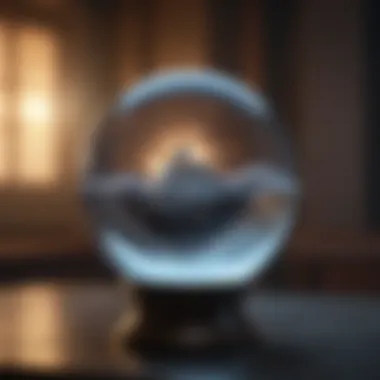Exploring Psychic Tricks: A Critical Examination


Intro
The topic of psychic tricks has always sparked curiosity among many people. Such phenomena often straddle the boundary between entertainment and belief. In examining these tricks, it is crucial to consider how they are not just simple illusions but intricate performances that draw on psychological manipulation, cultural beliefs, and even modern technology.
As we explore this field, we reveal the underlying methods and techniques that performers use to convince their audience of their abilities. This entails a detailed look into how audiences perceive these claims and the broader implications of believing in the paranormal. The significance of skepticism is paramount, especially as contemporary society grapples with a fascination for what lies beyond the tangible.
Key Research Findings
Overview of Recent Discoveries
Recent studies have brought light to the psychological mechanisms behind belief in psychic abilities. Research indicates that many participants in psychic demonstrations show a tendency for cognitive biases. For instance, confirmation bias can lead spectators to interpret ambiguous outcomes as evidence of paranormal phenomena. This is particularly noteworthy as it reveals a weakness in human cognition, which is often exploited by skilled performers.
Furthermore, the role of social dynamics has become a focal point in the analysis of psychic tricks. Groups tend to reinforce individual beliefs, creating a collective environment where skepticism is diminished. Engaging in groups often heightens the emotional intensity of the experience, making the tricks appear more believable.
Significance of Findings in the Field
These discoveries have critical implications for understanding psychic phenomena. They highlight the necessity for critical thinking and scientific inquiry when approaching such claims. The intersection of psychology and performance art provides insight into the methods used by practitioners. By unveiling the mechanics behind these tricks, individuals can better appreciate the skill involved rather than attributing their awe to supernatural abilities.
Overall, these findings contribute to a richer understanding of not just the tricks themselves but also the cultural narratives that surround them. For researchers, it underscores the importance of examining beliefs through a scientific lens.
Breakdown of Complex Concepts
Simplification of Advanced Theories
To grasp the nuances of psychic tricks, it's essential to break down advanced theories into more accessible components. The techniques often involve elements of misdirection, suggestion, and social influence. This includes:
- Misdirection: A common tool where the attention of the audience is diverted away from the secret method.
- Suggestion: Utilizing language and body signals to influence thoughts and reactions of observers.
- Social Influence: The power of social cues and group think in shaping perceptions.
Each of these components plays a critical role in how tricks are executed and perceived. By understanding these mechanisms, one can begin to demystify the illusion of psychic abilities.
Visual Aids and Infographics
Including visual aids can vastly improve the comprehension of these concepts. Diagrams illustrating the basic principles of misdirection or flowcharts depicting the social dynamics at play can provide clarity. Engaging with these tools allows for a more substantial grasp of both the techniques and the broader implications of belief in psychic phenomena.
"A deep understanding of behavior and perception is essential when evaluating claims of the paranormal."
While much of this exploration focuses on criticism and skepticism, it is equally vital to recognize the rich tapestry of culture, art, and psychology that surrounds the practice of psychic tricks. Emphasizing both the critique of the tricks and the appreciation of their complexity offers a balanced view that encourages further inquiry into this fascinating subject.
Prologue to Psychic Tricks
Understanding psychic tricks is essential to grasping the broader conversation regarding perceived supernatural abilities. This section serves as entry point into the realm of psychic phenomena, addressing their implications in both societal and individual contexts. By dissecting psychic tricks, we can better comprehend the nuances in human belief systems and the psychological aspects that influence them.
The common fascination with psychic abilities nurtures a culture that both celebrates and questions these phenomena. An awareness of the foundational concepts allows researchers and educators to foster deeper discussions on the legitimacy of such claims and their psychological consequences. Each part of this discourse is valuable, as it feeds into the larger narrative around belief, skepticism, and the human propensity to find meaning in the unexplained.
Defining Psychic Tricks
Psychic tricks encompass a variety of techniques that individuals claim to use to demonstrate supernatural insights or abilities. These may range from seemingly intuitive revelations about a person's life to extraordinary feats such as predicting future events. At their core, psychic tricks rely on creating a perception of special knowledge or abilities, often capitalizing on the expectations and beliefs of the audience.
Such tricks can include methods such as cold reading, where a psychics makes insightful statements based on observation and social cues. Conversely, hot reading involves previously acquired knowledge about a client, which is presented as psychic insight. Both methods exploit cognitive biases, leading individuals to attribute deep meaning to vague or general statements. By understanding these definitions, we see how psychic tricks are both intriguing and, at times, deceptive.
Historical Context and Origins
The history of psychic tricks can be traced back to ancient civilizations, where oracles and shamans played significant roles in their societies. The practice of divination, for instance, reveals early human attempts to predict the future or glean hidden knowledge through seemingly mystical means. In every culture, similar practices arose, demonstrating a universal desire to connect with the unknown.
Over time, these practices transformed into forms recognizable in contemporary society. The emergence of the spiritualist movement in the 19th century marked a significant shift. Figures like Madame Blavatsky and the Fox sisters captivated public attention, leading to increased interest in psychic performances.
As science progressed, the question of legitimacy arose, fueling both exploration and skepticism about psychic claims. Historical accounts reveal a compelling interplay between belief and inquiry, highlighting cultural attitudes towards these seemingly inexplicable experiences. Today, an understanding of this rich history provides context for current perceptions of psychic tricks and sets the stage for deeper investigation into their psychological impact.
Psychological Underpinnings


The psychological underpinnings of psychic tricks are essential to understand their allure and effectiveness. Many individuals are drawn to these phenomena, often attributing them to supernatural abilities. However, a deeper examination reveals that cognitive processes and social dynamics heavily influence perceptions and beliefs surrounding psychic phenomena. These elements can help explain why people engage with psychics and how they might interpret their experiences.
Understanding these psychological factors allows for greater insight into the mechanisms that facilitate belief in psychic tricks. This analysis encompasses various aspects: cognitive biases, the power of suggestion, and the role of expectation, which are all contributors to the efficacy and allure of psychic performances.
The Role of Cognitive Biases
Cognitive biases are systematic patterns of deviation from norm or rationality in judgment. They play a crucial role in how individuals perceive and evaluate psychic abilities. For instance, confirmation bias can lead a person to favor information that validates their existing beliefs about psychics. When someone believes a psychic has abilities, they may focus more on successful predictions and ignore instances where the psychic's predictions fail.
Moreover, the Barnum effect, a cognitive bias where individuals believe vague or general statements apply specifically to them, enhances the convincing nature of psychic readings. This theory is evident when psychics make broad statements that resonate with many individuals. Since people often seek personal meaning, they tend to latch onto these statements, further validating the psychic's credibility.
- Common cognitive biases that influence belief in psychic abilities include:
- Confirmation bias
- The Barnum effect
- Availability heuristic
These biases help maintain the psychic's status and clientele, making it a feedback loop that reinforces belief in psychic abilities.
The Power of Suggestion
Suggestion is another potent psychological mechanism at play in psychic demonstrations. The ability of a psychic to influence a person’s thoughts and feelings through subtle cues can be significant. This phenomenon reveals how susceptible people can be to suggestion, which often leads individuals to believe they are experiencing something paranormal.
For instance, a psychic might state an ambiguous phrase that can be interpreted in multiple ways. As the individual listens, their mind begins to shape the message into something personal, often leading them to believe it is specific to their circumstances. Hypnosis and deep suggestibility can further enhance this level of influence, creating a profound effect on the audience's perception of the performance.
"People often hold beliefs that align with their desires. This makes them more open to accepting suggestions, particularly in contexts like psychic readings."
Common Techniques in Psychic Trickery
The examination of common techniques in psychic trickery is crucial to understanding how these purported abilities are presented and perceived. It reveals the underlying mechanisms that facilitate the illusion of psychic phenomena. Understanding these techniques sheds light on the mental and emotional aspects that often lead individuals to believe in such abilities. There are notable techniques in play, including cold reading, hot reading, and the use of psychological manipulation, each serving a distinct purpose in the fabric of psychic performance.
Cold Reading
Cold reading involves observation and deduction skills that allow an individual to make generalized statements based on the subject’s appearance, body language, and reactions. Practitioners of cold reading are adept at picking up subtle cues that can lead to accurate guesses about a person’s life. For example, a psychic may notice a wedding ring and comment on marital status, leading the person to believe that the reader has special insight. This technique relies heavily on anecdotal evidence and widely applicable statements.
The effectiveness of cold reading results from its ambiguity, wherein the trickster leaves room for interpretation. This generates a perception of accuracy in their statements. It's important to emphasize that, while many people find insights from cold reading compelling, these techniques hinge on broad observations rather than any psychic gifts.
Hot Reading
Hot reading is another technique used in psychic performances, wherein the performer gathers information about a person before the reading occurs. This could involve social media research or obtaining details through informal conversations. When the psychic then refers to specific events, names, or personal details that the subject believes had not been disclosed, the effect can be astonishing.
Hot reading exploits the subject's own assumptions about privacy and disclosure. By creating the illusion of supernatural knowledge, the technique deepens the audience’s belief in the performer’s abilities. However, the success of hot reading raises ethical concerns regarding invasion of privacy, as well as the manipulation of individuals who seek guidance or comfort.
The Use of Psychological Manipulation
Psychological manipulation encompasses a range of subtle strategies used to steer audience perception in favor of the psychic experience. This includes the implementation of suggestion, where the psychic may lead individuals to certain conclusions through carefully chosen language and phrasing.
Techniques such as the Barnum effect, which refers to the tendency for people to accept vague and general statements as personally meaningful, are pivotal. Additionally, psychics may utilize emotional appeals to tap into the audience's hopes or fears, thereby forging a deeper connection and lending an air of authenticity.
"Psychological manipulation can create a profound emotional response, reinforcing belief in the supernatural."
In reviewing these common techniques, one observes a pattern of careful observation, manipulation, and situational awareness. Each approach enables the purported psychic to maintain control over the narrative, guiding the audience toward a predefined interpretation of the experience. These insights not only help demystify the spectacle surrounding psychic performances but also underscore the importance of skepticism in assessing claims of supernatural abilities.
Technological Influences on Psychic Demonstrations
The intersection of technology and psychic demonstrations has transformed the landscape of what was once strictly in-person exhibitions of alleged supernatural abilities. In today's digital age, the proliferation of technology has provided new platforms for psychics to showcase their skills, whether real or fabricated. This section explores the role that technology plays in both the performance and perception of psychic phenomena, emphasizing both advantages and drawbacks.
Digital Mediums and Online Espionage
Digital mediums have emerged as a prominent avenue for psychics in modern society. Websites designed for psychic readings allow individuals from various backgrounds to offer services ranging from tarot readings to clairvoyance. These digital platforms present not only accessibility but also anonymity, attracting a diverse clientele. However, the rise of such platforms has led to ethical concerns. The potential for online espionage is a serious issue. Practitioners can easily gather personal information through social media, which can be subtly integrated into readings to enhance credibility.
This strategy often utilizes public information, making it seem as if the psychic possesses an extraordinary ability to connect on a personal level. This form of manipulation raises significant ethical questions. Clients may leave these sessions feeling validated, but the authenticity of their experiences can be heavily scrutinized. The ease of access to personal data undermines genuine psychic claims and highlights a need for critical engagement with such services.


Social Media's Role in Propagation
Social media has considerably influenced how psychic tricks are disseminated and perceived. Platforms like Facebook, Instagram, and TikTok serve as both marketing tools and performance spaces for psychics. They enable practitioners to reach a vast audience quickly by sharing engaging content that can easily go viral. This mass propagation can amplify public interest in psychics and the paranormal.
On social media, the visual and interactive nature allows psychics to craft compelling narratives around their abilities. Well-produced videos showcasing demonstrations can lure in viewers, who often share this content, perpetuating the cycle of belief. Yet, this effect is twofold; it can lead to increased skepticism as audiences become more aware of the tricks behind the performances. The transparency that social media provides can also expose the inconsistencies in psychic claims, encouraging critical discussion among viewers.
Cultural Reception and Impact
The cultural reception of psychic phenomena plays a crucial role in shaping public perception and belief in these claims. It influences how society views concepts of the supernatural, and therefore compels the continued exploration into the realm of psychic tricks. Understanding this reception leads to insights about the social and psychological factors that contribute to the popularity of psychics.
Psychic Phenomena in Popular Culture
Psychic tricks have found their way into various aspects of popular culture. Movies, television shows, and literature often feature characters with supernatural abilities. This representation can foster curiosity and intrigue among the audience. Shows like The Mentalist and movies such as The Sixth Sense perpetuate interest in the idea of psychic abilities.
This portrayal can create a fascinating dichotomy. On one hand, it entertains and sparks the imaginations of viewers. On the other hand, it can mislead individuals regarding the nature of psychic claims. As people consume these media, they may develop a skewed perception of what psychics can actually do. It can also contribute to the normalization of psychic practices, making them seem more legitimate than they might be.
"The allure of psychic phenomena often transcends reality, shaping beliefs and expectations that can sometimes lead to disappointment."
Maintaining a critical stance when engaging with these depictions is essential. One must remember they are often dramatized for effect, serving the narrative rather than presenting factual accuracy concerning psychic abilities.
Belief Systems and Their Influence
Belief systems are foundational in determining how psychic phenomena are perceived. Cultural, personal, and societal beliefs shape individual perspectives on the supernatural. For example, in some cultures, belief in psychics is intertwined with spiritual practices and healing traditions. These cultural narratives often lend credibility to psychic claims, as individuals may attribute personal experiences or feelings to paranormal explanations.
Additionally, confirmation bias plays a significant role. People tend to favor information that supports their existing beliefs. When someone believes in psychic abilities, they are more likely to accept anecdotal evidence while dismissing skeptical views. This creates a reinforcing cycle where belief systems remain intact, influenced by selective exposure and interpretation of experiences.
In examining these systems, it is important to recognize the intersectionality of culture and belief. Factors such as education, personal experience, and broader societal values contribute to individuals' willingness to engage with psychic claims.
In summary, the cultural reception of psychic phenomena and the underlying belief systems are pivotal in understanding the impact of psychic tricks. They not only shape public interest but also influence the credibility assigned to these practices. A comprehensive analysis of these aspects provides a clearer picture of the complex relationship between society and psychic phenomena.
Scientific Skepticism and Inquiry
Scientific skepticism is essential when examining the claims of psychic abilities. It refers to an approach that encourages questioning, rigorous analysis, and evaluation of evidence before accepting any assertion as true. In the realm of psychic tricks, where anecdotal evidence often outweighs empirical data, adopting a skeptical viewpoint is crucial. This section aims to highlight the importance of scientific skepticism and the benefits of inquiry for understanding psychic phenomena. By engaging critically with these claims, individuals can better navigate the often murky waters of paranormal assertions.
Evaluating Claims of Psychic Abilities
Evaluating claims of psychic abilities requires a systematic examination of the evidence presented. Claims often rely on testimonials or personal experiences, which, while compelling, lack the objective support found in controlled studies. Methods for evaluating these claims include:
- Analyzing the context: Understanding the circumstances in which the claims are made can reveal whether they are genuine or fabricated.
- Seeking replicability: A true psychic ability should yield consistent results under similar conditions. When claims cannot be reliably reproduced, they should be treated with skepticism.
- Collecting data: Employing scientific methods to gather quantitative data can help distinguish fact from fiction. Researchers can apply double-blind tests and observational studies to gauge the accuracy of psychic predictions.
In considering these criteria, one must remain vigilant about cognitive biases. It's easy for individuals to fall prey to confirmation bias, where they seek information that supports their beliefs while disregarding conflicting evidence.
Research and Studies on Psychic Tricks
Research on psychic tricks is limited, but some studies have aimed to investigate the validity of claims surrounding psychic phenomena. These studies often focus on methods like cold reading and hot reading to explore how supposed psychics operate.
Key points include:
- Historical research: Studies conducted in the mid-20th century brought attention to the methods used by psychics. The work of scientists such as James Randi and his investigations into paranormal claims highlighted the need for critical scrutiny in this field.
- Contemporary investigations: Modern-day researchers utilize advanced techniques in psychology to dissect psychic phenomena. For example, studies have tested the efficacy of various psychic practices, revealing them to be statistically insignificant in terms of accuracy compared to chance.
- Practical applications of findings: Understanding these studies can inspire healthier skepticism among the public. By recognizing that many psychic claims fail under scientific scrutiny, individuals can protect themselves from potential manipulation.
"In the absence of evidence, skepticism is the hallmark of critical thinking."
The Ethics of Psychics
The study of psychic tricks raises significant ethical questions that merit careful consideration. Understanding the ethics surrounding psychic claims is essential for both practitioners and consumers of these services. This discussion not only informs the public about potential risks but also encourages psychics to reflect on their responsibilities. The implications of their actions can significantly impact individual lives and society as a whole.
Responsibility Toward the Audience
Psychics, whether genuine or not, hold a unique position of influence over their audience. Their ability to sway thoughts and emotions is profound. It is crucial for psychics to recognize the weight of that responsibility. Audiences often approach these practitioners in vulnerable states, seeking comfort, guidance, or answers to complex life issues.


Practitioners should strive to maintain transparency and honesty in their presentations. Failing to do so can lead to emotional distress or financial exploitation of those who seek help. By holding high ethical standards, psychics can foster trust and integrity in their practice and minimize harmful outcomes.
Key aspects to consider include:
- Informed Consent: Clients should understand what to expect from a session.
- Clarifying Limitations: Practitioners must be clear about the non-scientific nature of their services.
- Avoiding Manipulation: It is unacceptable to exploit vulnerabilities by preying on fears or desires for gain.
Demystifying Exploitation of Vulnerable Individuals
The most pressing ethical issue in the realm of psychic practices is the exploitation of vulnerable individuals. People facing personal challenges often turn to psychics for solace, guidance, or understanding. This desire for comfort creates an opportunity for some practitioners to take advantage of these vulnerable states.
Exploitation can manifest in various forms, and it is essential to recognize these to protect potential victims. Some practices include:
- Financial Exploitation: Charging exorbitant fees for services that lack scientific basis.
- Emotional Manipulation: Using personal details to create a false sense of hope or dependency.
- Fear Induction: Instilling a sense of dread regarding bad omens, leading clients to seek repeat sessions or additional costly services.
By addressing these concerns, practitioners and consumers alike can work to create a safer environment. Promoting regulations or self-regulatory standards within the psychic community can help diminish exploitation while fostering ethical practices.
The Future of Psychic Tricks
As society progresses, the fascination with psychic tricks continues to evolve. This section discusses how these practices might develop in the coming years, analyzing the interplay between tradition and modern influences. The future of psychic tricks holds significant implications for both practitioners and skeptics. Understanding emerging trends and the impact of technology is key to navigating this evolving landscape.
Emerging Trends in Psychic Practices
Many changes are occurring in the realm of psychic practices today. These shifts can manifest in various forms:
- Increased Professionalization: More individuals are pursuing formal training in psychic techniques, attending workshops, and obtaining certifications. This trend adds legitimacy to the field but raises questions about the authenticity of claims.
- Holistic Integration: Psychics increasingly integrate holistic practices like wellness and self-care. This merging reflects a growing understanding of the body-mind connection.
- Community Building: Online platforms and forums are becoming significant venues for psychic practitioners. These communities allow for sharing experiences, leading to new understandings of psychic phenomena.
The emergence of these trends highlights the constant adaptation within the field. Consumers are demanding more from practitioners, seeking not just entertainment but meaningful experiences. This demand may lead psychics to evolve their practices further.
The Intersection of Technology and Psychic Claims
Technology increasingly plays a role in psychic practices. Modern tools can enhance the way psychics connect with clients and demonstrate their supposed abilities. Key aspects include:
- Digital Platforms: Websites and social media allow psychics to reach broader audiences. This increased visibility can lead to more significant followings and commercial opportunities but can also allow for critics and skeptics to voice their opinions more easily.
- Virtual Reality: Technology such as virtual reality could enable immersive experiences for those seeking psychic consultations. This method may offer a new dimension to how psychic tricks are perceived, potentially blurring the line between reality and illusion.
- Data Analytics: While this might sound counterintuitive, analyzing clients’ behaviors and preferences could lead practitioners in tailoring their messages. This adapatation might enhance the persuasive aspect of their performances but raises ethical concerns regarding manipulation.
The impact of technology on psychic claims invites scrutiny and debate. As techniques evolve, so too must the approach of skeptics and researchers.
Finale
The conclusion of this article serves as an essential component for framing the entire exploration of psychic tricks. After dissecting the various methodologies and psychological mechanisms behind these phenomena, it becomes apparent that a multifaceted understanding is crucial. First, synthesizing the insights derived from the prior sections provides clarity on how psychic tricks operate in both social and cultural constructs. This informed perspective can empower individuals to remain skeptical and analytical when confronted with claims of paranormal abilities.
Furthermore, a critical investigation reveals that these tricks exploit human emotions and cognitive biases. Recognizing this can foster a more educated audience that questions rather than simply accepts the assertions made by purported psychics.
This awareness is particularly vital in today's rapidly evolving information landscape. There are a vast number of platforms where psychic demonstrations are broadcasted to audiences eager for connection or solace. By unraveling the complexities of both the practice and belief in psychic abilities, individuals can make informed choices about their engagement with these phenomena.
Ultimately, the conclusion emphasizes the interplay between skepticism and belief in the realm of psychic tricks, highlighting that a nuanced understanding can significantly influence how society approaches claims of the supernatural.
Synthesis of Insights
Bringing together the diverse facets discussed throughout this article, it is evident that psychic tricks incorporate a rich tapestry of psychological principles and cultural contexts. Each section contributes to a holistic image of how these abilities are perceived and the methodologies employed by practitioners. One key insight is the powerful role of cognitive biases, which often lead individuals to overlook logical explanations in favor of supernatural interpretations.
Moreover, technology's influence cannot be understated. Digital platforms have democratized access to psychic demonstrations but have also amplified the need for critical thinking. The study of psychic tricks reveals that the phenomena are not simply tricks performed for amusement; they also flourish due to deeply rooted belief systems and societal values.
In this synthesis, several points emerge as particularly relevant:
- The relationship between psychological conditioning and perceptions of psychic abilities.
- The impact of cultural narratives in shaping belief in the supernatural.
- The necessity for ongoing scientific inquiry and skepticism to combat misinformation.
By understanding these interconnected dimensions, readers gain a richer context for the psychic realm.
Final Thoughts on Psychic Tricks
As we conclude this examination of psychic tricks, it is worthwhile to reflect on the implications of our findings. The act of identifying and understanding these tricks promotes a culture of inquiry that values evidence over anecdote. In a world that is often swayed by sensational claims, cultivating skepticism allows individuals to navigate paradigms of belief more effectively.
The essence of psychic ability, shrouded in both allure and skepticism, invites ongoing discussion. As audiences evolve and technology advances, the nature and execution of psychic tricks will likewise shift.
Therefore, critical reflection does not merely serve to debunk; it encourages curiosity about why these beliefs persist despite a lack of empirical support. Engaging thoughtfully with psychic phenomena fosters a more insightful discourse, ultimately leading to a better-informed public.
To engage meaningfully with the supernatural, one must first master the art of skepticism, allowing for a perspective that is both curious and discerning.















